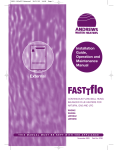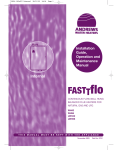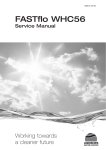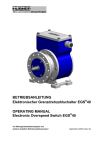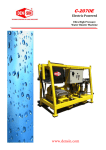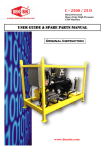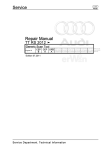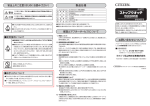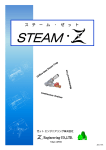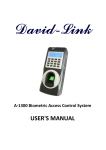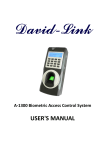Download andrews WH56 Installation guide
Transcript
This manual must be kept with the appliance October 2010 Part No E791 FASTflo (internal) Installation Guide, Operation and Maintenance Manual Continuous Flow Wall Hung Balanced Flue Water Heaters for Natural Gas and LPG WH42, WH56, LWH42, LWH56 Working towards a cleaner future 2 SECTION XX • INTRODUCTION Reproduction of any information in this publication by any method is not permitted unless prior written approval has been obtained from Andrews Water Heaters. Andrews Storage Water Heaters have been designed and manufactured to comply with current international standards of safety. In the interests of the health and safety of personnel and the continued safe, reliable operation of the equipment, safe working practices must be employed at all times. The attention of UK users is drawn to their responsibilities under the Health and Safety Regulations 1993. All installation and service on Andrews Water Heaters must be carried out by properly qualified personnel and, therefore, no liability can be accepted for any damage or malfunction caused as a result of intervention by unauthorised personnel. Andrews Water Heaters’ policy is one of continuous product improvement and, therefore, the information in this manual, whilst completely up to date at the time of publication, may be subject to revision without prior notice. Further information and assistance can be obtained from: Andrews Water Heaters Wood Lane, Erdington, Birmingham B24 9QP Tel: 0845 070 1055 Fax: 0845 070 1059 Email: [email protected] Website: www.andrewswaterheaters.com Copyright Andrews Water Heaters 2010 CONTENTS PAGE GENERAL AND SAFETY INFORMATION 4 SECTION 1 INCLUDED ACCESSORIES 5 SECTION 2 QUICK CONNECT MULTI SYSTEM INSTALLATION 6 SECTION 3 BEFORE INSTALLATION 7 SECTION 4 CHOOSING INSTALLATION SITE 8 SECTION 5 INSTALLATION CLEARANCES 9 SECTION 6 INSTALLATION 10 SECTION 7 FLUE PIPE INSTALLATION (External) 11 SECTION 8 GAS PIPING 17 SECTION 9 WATER PIPING 18 SECTION 10 ELECTRICAL WIRING 19 SECTION 11 COMMISSIONING 21 SECTION 12 DIMENSIONS 23 SECTION 13 Remote CONTROLLER INSTALLATION 25 SECTION 14 SERVICING 26 SECTION 15 DISASSEMBLY 26 SECTION 16 SERVICING PARTS LIST 32 SPECIFICATIONS 44 3 4 GENERAL SAFETY INFORMATION Installation Manual GAS WATER HEATER WH42, LWH42 WH56, LWH56 (Internal) (Internal) WARNING: If the information in this manual is not followed exactly, a fire or explosion may result causing property damage, personal injury or death. Potential dangers from accidents during installation and use are divided into the following three categories. Closely observe these warnings, they are critical to your safety. Danger Danger of serious injury or even death as well as danger of fire when the product is misused by ignoring this symbol. Warning Possibility of serious injury or even death as well as possibility of fire when the product is misused by ignoring this symbol. Caution Possibility of bodily injury or damage to property when the product is misused by ignoring this symbol. Prohibited Disconnect Power Earth Be sure to do Requests to Installers Caution • In order to use the water heater safely, read this installation manual carefully, and follow the installation instructions. • Failures and damage caused by erroneous work or work not as instructed in this manual are not covered by the warranty. • Check that the installation was done properly in accordance with this Installation Manual upon completion. • After completion of installation, be sure to hand the Operation Manual to the customer upon filling in all of the required items. • The appliance must be installed in accordance with the Gas Safety (Installation and Use) Regulations and the rules in force in the country of installation. • The manufacturer's instructions supplied. • The Gas Safety (Installation and Use) Regulations. • The appropriate Buildings Regulations either The Building Regulations, The Building Regulations (Scotland), The Building Regulations (Northern lreland). • In IE, the installation must be carried out by a competent person and installed in accordance with the current edition of I.S.813 "Domestic Gas Installations", the current Building Regulations and reference should be made to the current ETCI rules for Electrical Installation. SAR8286-3 *SAR8286 C* INCLUDED ACCESSORIES 1. Included Accessories Part Shape 5 The following accessories are included with the unit. Check for any missing items before starting installation. Q’ty Part Shape Owner's Guide 1 Installation Manual (this document) 1 Crescent clamp 1 Drain hose 1 Tapping Screw 5 Q’ty 6 QUICK CONNECT MULTI SYSTEM INSTALLATION 2. Quick Connect Multi System Installation • The Quick Connect Multi System allows the installation of two units together utilizing only the Quick Connect Cord. The Quick Connect Cord is 2m. long. Install the two units 470mm-950mm apart at the center to ensure the cord will be able to reach between the units. (See Typical Plumbing diagram). (If the distance between the two units is too great, not only will the cord not be able to reach, but the water temperature may also become unstable because of the difference in pipe length between the two units.) System Diagram Quick Connect Cord Cord Connector * When connecting 2 devices, use only a single remote controller. Cord Connector Note: Connect the remote controller to only one of the devices. Terminal Block Remote Controller Remote Controller Cord Gas Supply Piping G Cold Water Supply Hot Water Typical Plumbing Distance at center: 470 - 950mm. Distance on sides 5 - 480mm. Union Union Make this distance as short as possible. * The hot water temperature will become unstable as the pipe length increases. Quick Connect Cord Shutoff Valve Union Gas Valve Shutoff Valve Shutoff Valve Hot Water Cold Water Leave enough clearance around the plumbing to apply insulation. It will be necessary to add bends to the piping to ensure that this clearance is available. Size the piping to allow for the maximum flow rates of the units. • Insulate the hot water piping to prevent heat loss. Insulate and apply heating materials to the cold water supply piping to prevent heat loss and freezing of pipes when exposed to excessively cold temperatures. BEFORE INSTALLATION 3. Before Installation Caution Check the Gas • Check that the rating plate indicates the correct type of gas. Check that the gas supply line is sized for 62.3 kW(or 49.0 kW) for this unit. Check the Power • The power supply required is 230V AC, at 50Hz. Using the incorrect voltage may result in fire or electric shock. Do Not Use Equipment for Purposes Other Than Those Specified • Do not use for purposes other than increasing the temperature of the water supply, as unexpected accidents may occur as a result. Check Water Supply Quality • If the water supply is hard, acidic or otherwise impure, treat the water with approved methods in order to ensure full warranty coverage. Use Extreme Caution if Using With A Solar Pre-Heater • Using this unit with a solar pre-heater can lead to unpredictable output temperatures and possibly scalding. If absolutely necessary, use mixing valves to ensure output temperatures do not get to scalding levels. Do not use a solar pre-heater with the quick-connect multi-system. Checkup • Check the fixing brackets and the flue pipe yearly for damage or wear. Replace if necessary. 7 8 CHOOSING AN INSTALLATION SITE 4. Choosing Installation Site The appliance must be installed in a suitably ventilated room, in accordance with the regulatins in force. * Locate the appliance in an area where leakage from the unit or connections will not result in damage to the area adjacent to the appliance or to the lower floors of the structure. When such locations cannot be avoided, it is recommended that a suitable drain pan, adequately drained, be installed under the appliance. The pan must not restrict combustion air flow. Caution • The water heater is designed for internal installation only. Never install it outdoors or in a bathroom, it may be damaged or a fire may be caused. • Consult with the customer concerning the location of installation. • Avoid places where fires are common, such as those where petrol, benzene and adhesives are handled, or places in which corrosive gases (ammonia, chlorine, sulfur, ethylene compounds, acids) are present. This may cause incomplete combustion or failures. • Locate the flue terminal so that there are no obstacles around the termination and so that exhaust can't accumulate. Do not enclose the termination with corrugated metal or other materials. • Install the water heater in an area that allows for the proper clearances to combustible and noncombustible construction. Consult the rating plate on the appliance for proper clearances. • Do not install the water heater in a place where it may be threatened by falling objects, such as under shelves. • The water heater must be installed in a place where supply and exhaust pipes can be installed as directed. • Do not install the water heater where the exhaust will blow on outer walls or material not resistant to heat. Also consider the surrounding trees and animals. The heat and moisture from the water heater may cause discoloration of walls and resinous materials, or corrosion of aluminum materials. • Avoid installation above gas ranges or stoves. • Avoid installation between the kitchen fan and stove. If oily fumes or a large amount of steam are present in the installation location, take measures to prevent the fumes and steam from entering in the equipment. • Avoid installation in places where dust or debris will accumulate. Dust may block the air-supply opening, causing the performance of the fan motor to drop and incomplete combustion to occur as a result. • Install in a location where the exhaust gas flow will not be affected by fans or range hoods. • Take care that noise and exhaust gas will not affect neighbors. • Avoid installation in places where special chemical agents (e.g., hair spray or spray detergent) are used. Ignition failures and malfunction may occur as a result. 6 INSTALLATION CLEARANCES 5. Installation Clearances 9 Caution Before installing, check for the following: The appliance must be installed in a suitably ventilated room, in accordance with the regulations in force. Install in accordance with relevant building and mechanical codes, as well as any local, state or national regulations. Distance from combustibles Item Check Illustration • Maintain the following clearances from both combustible and non-combustible materials. 45 mm or more 45 mm or more Distance from the top surface Distance from the side Outdoor Clearances to Opening into Any Building Securing of space for repair/inspection • If possible, leave 200mm or more on either side of the unit to facilitate inspection. • If possible, leave 600mm or more in front of the unit to facilitate maintenance and service if necessary. 200mm or more Consult the flue manufacturer for clearances 200mm or more 600mm or more • There must be a clearance of 600mm or more in front of the flue terminal. • This restriction will not be applied to an area where an effective shield makes a clearance of 600mm or more in front of the exhaust outlet. There must be no building opening within this area. 300mm or more Flue Terminal 300mm or more 300mm 300mm or more or more 10 INSTALLATION 6. Installation Securing to the wall • The weight of the device will be applied to the wall. If the strength of the wall is not sufficient, reinforcement must be done to prevent the transfer of vibration. • Do not drop or apply unnecessary force to the device when installing. Internal parts may be damaged and may become highly dangerous. • Install the unit on a vertical wall and ensure that it is level. Item Check Locating Screw Holes Caution • When installing with bare hands, take caution to not inflict injury. • Be careful not to hit electrical wiring, gas, or water piping while drilling holes. Illustration Location of Screw Hole Mounting Bracket (upper) 1. Drill a single screw hole, making sure to hit a stud. 2. Insert and tighten the screw and hang the unit by the upper wall mounting bracket. 3. Determine the positions for the remaining four screws (two for the top bracket and two for the bottom), and remove the unit. 4. Drill holes for the remaining four screws. Mounting 5. Hang the unit again by the first screw, and then insert and tighten the remaining four screws. Structure 6. Take waterproofing measures so that water does not enter the building from screws mounting the device. • Make sure the unit is installed securely so that it will not fall or move due to vibrations or earth-quakes. @&@+ Q @ @ Locating Screw Holes Tapping Screw FLUE PIPE INSTALLATION 11 7. Flue Pipe Installation (Internal Installation Only) Flue Terminal Installation • Follow the installation instructions included with the flue terminal and which are reproduced at the end of this manual. This appliance must be the flue through the wall, not vertically to the roof. Flue Terminal Installation Precautions Note the following flue terminal installation requirements • Do not install the flue terminal indoors • Install the flue terminal with a downward slope downward slope upward slope • Avoid installing the terminal where obstacles will block it Flue Terminal Flue Terminal Flue Terminal Snow drift • In the case the discharge direction of the exhaust is to the side as shown in the diagram below, do not select the supply/exhaust tube top. Incomplete combustion caused by short cycling of exhaust gas may occur as a result. (except terminal guard.) Snow drift Tree • Clearance from the flue terminal. If multiple units are installed, terminals must be separated by 300mm or more in a plain view regardless of the vertical clearance. 300mm or more 300mm or more Flue Terminal Flue Terminal 1500mm or more (terminal above a terminal.) 12 FLUE PIPE INSTALLATION Detailed recommendations for the flue installations are given in BS 5440:1:2000. The following notes are for general guidance only. Note: An adapter is always required on top of the heater. For the vertical flue set up, offset adapter will be supplied for the air intake. a) The flue system must be constructed using only ANDREWS WATER HEATERS approved components. b) It is important that the position of the terminal allows free passage of air across it at all times. c) It is ESSENTIAL TO ENSURE that products of combustion discharging from the terminal cannot reenter the building, or any other adjacent building, through ventilators, windows, doors, other sources of natural air infiltration, or forced ventilation / air conditioning. d) The minimum acceptable dimensions from the flue terminal to obstructions and ventilation openings are specified in Figs. 4& 5 opposite. e) If the flue terminal discharges into a pathway or passageway check that combustion products will not cause nuisance and that the terminal will not obstruct the passageway. Assembling Air/Flue Pipes The flue pipes must be assembled with the plain end of pipe or fitting nearest the boiler and the female (socket) end furthest from the boiler. Check that a seal is fitted in every socket. Always adjust length of pipes by cutting and de-burring plain end so that it does not damage or disturb the seal. Remove burrs from inside and outside of pipe and ensure the pipe is clean and free from oil and grease. Any generally "horizontal" run of the flue pipe MUST NOT FORM A LOW POINT at which condensate could accumulate. a. Measure and cut the first pair of the flue pipes away from the appliance. Push pipes fully into the sockets on top of the boiler whilst also fitting the flue duct prepared as above. b. Measure and cut next pair of the air/flue pipes. c. Prepare pipe support brackets as required before engaging pipes with the socket of preceding pipes or bends. d. Push pipes together as before taking care not to dislodge seals. When cutting and fitting the flue pipes on extended the flue systems, allow approx. 5 mm clearance at the bottom of each joint - see Fig. 8. e. Repeat above procedure to reach terminal. Ensure that air inlet and the flue gas connections are correctly made and are not inadvertently reversed. f. Fix pipe supports to masonry or woodwork so that the flue/air pipes are held securely in position. g. Check especially that all joints within any duct or other void are correctly engaged and sealed before fixing the ductwork. FLUE PIPE INSTALLATION 13 Installing Horizontal Extended Terminal Important: The flue terminal must be installed horizontally. 1. Mark the centre of the 152mm diameter hole and core drill. Note: If the wall is clad with a combustible material an additional 25mm wide area must be removed around liner. 2. Measure the wall thickness and cut the liner to this length. Note: Cut opposite end to rim and allow some material to be used as tabs on the inside of the wall to ensure a secure fixing. Note:If the terminal has to be fitted from inside the property, the liner can be inserted with the rim on the inside. 3. Fit the liner through the hole and make good internal and external rendering. The latter may be done with arm extended through liner. 4. Push the flue terminal assembly into liner. Ensure terminal protrudes by 110mm from the wall. Important: The grille must be totally exposed to air. Fit the closure plate around the pipes and secure to the wall. 5. The flue pipe MUST be supported by a pipe clamp before the first joint. Note: The flue pipe ends with a female socket designed for use with the optional 3° Bend. If not using the bend, the socket should be cut off the flue pipe. 14 FLUE PIPE INSTALLATION M&G HORIZONTAL FLUE TERMINAL • Use only the following models of the flue terminals with this unit. • The M&G Horizontal Flue Terminal can be cut to suit the wall thickness. Wall thickness 50 mm to 500 mm Flue Precautions • Use 100mm diameter flue pipe. • Maximum flue length 4 elbow (90 degree) + 7m (flue pipe) + Flue Terminal 1 elbow (90 degree) + 12m (flue pipe) + Flue Terminal • Minimum flue length 1 elbow (90 degree) + Flue Terminal • Exceeding the maximum flue length is dangerous and may result in bad combustion. • Maximum 90 degree bends not to exceed 4. • Maximum length must be reduced by 2000mm for each 90° bend used. • Maximum length must be reduced by 1000mm for each 45° bend used. • If possible, don’t install the flue pipe through any enclosed areas.If necessary,consult ANDREWS WATER HEATER for clearances. • Install the flue terminal so that all exhaust is directed to and all intake air is taken from outdoors. • Do not store hazardous or flammable substances near the flue terminal. • Slope the intake and exhaust pipes at a 1/50 grade down towards the termination. • Connect the flue pipe firmly so that it will prevent exhaust gases from leaking. • Steam or condensed water may drip out of the flue terminal. Dispose of this condensed water according to local codes and in order to prevent injury or property damage. • If this product will be installed in an area where snow is known to accumulate,protect the flue termination from blockage by snow drifts or damage from snow falling off of roofs. • Support the flue pipe with hangers at intervals. • Install the flue terminal so that it is easily accessible for maintenance both from the indoors and the outdoors. • If the flue terminal will be installed higher than the water heater, make the vertical section directly above the water heater as short as possible,and slope down to the terminal. Do not have another vertical section after the horizontal section begins. • Make the vertical pipe as short as possible. FLUE PIPE INSTALLATION 15 M&G VERTICAL FLUE TERMINAL • Use only the following models of the flue terminals with this unit. • The M&G Vertical Flue Terminal can be cut to suit the roof. Roof thickness 50 mm to 500 mm Flue Precautions • Use 100mm diameter flue pipe. • Maximum flue length 4 elbow (90 degree) + 7m (flue pipe) + Flue Terminal 1 elbow (90 degree) + 12m (flue pipe) + Flue Terminal • Minimum flue length 1 elbow (90 degree) + Flue Terminal • Exceeding the maximum flue length is dangerous and may result in bad combustion. • Maximum 90 degree bends not to exceed 4. • Maximum length must be reduced by 2000mm for each 90° bend used. • Maximum length must be reduced by 1000mm for each 45° bend used. • If possible, don’t install the flue pipe through any enclosed areas. If necessary, consult ANDREWS WATER HEATER for clearances. • Install the flue terminal so that all exhaust is directed to and all intake air is taken from outdoors. • Do not store hazardous or flammable substances near the flue terminal. • Slope the intake and exhaust pipes at a 1/50 grade down towards the termination. • Connect the flue pipe firmly so that it will prevent exhaust gases from leaking. • Steam or condensed water may drip out of the flue terminal. Dispose of this condensed water according to local codes and in order to prevent injury or property damage. • Fit condensate trap and siphon to flues over 2m high. • If this product will be installed in an area where snow is known to accumulate,protect the flue termination from blockage by snow drifts or damage from snow falling off of roofs. • Support the flue pipe with hangers at intervals. • Install the flue terminal so that it is easily accessible for maintenance both from the indoors and the outdoors. • If the flue terminal will be installed higher than the water heater,make the vertical section directly above the water heater as short as possible,and slope down to the terminal. Do not have another vertical section after the horizontal section begins. • Make the vertical pipe as short as possible. 16 FLUE PIPE INSTALLATION Connecter for switching airflow rate depending on exhaust conditions Under the exhaust conditions indicated by the shaded portion of the table below, the connector for switching the airflow rate shown in the illustration below is pulled out. (Changes the speed of fan rotation.) <Extending conditions for the exhaust flues> Bends Length 1m 2m 3m 4m 5m 6m 7m 8m 9m 10 m 11 m 12 m 112 234567890 33445566778899001122 12 12 1233445566778899001122 123456789012 12 112 23456789033445566778899001122 33445566778899001122 12 12 12 12345678903456789012 12 12345673456 1 2 1234567890 123456789012 123456789012 3456789012 12 12 1233445566778899001122 123456789012 1234567890 7 Pulling out Connector 3 1234567 4 1233445566 77 12 1234567890 123456789012 1233445566778899001122 12 1233445566778899001122 12 123456789012 123456789012 1234567890 3 33 3 3456 12 1233445566 12 1234567 99 99 99 7 77 3 33 33 9393 99 9 9 Connector to switch the airflow amount Connector to switch the airflow amount Controller [Extending limits for the exhaust flues] 4 bends within 7 m 1 bend within 12 m The power must be unplugged when adjusting (pulling in or out) the connector to switch the airflow amount. When the intake/exhaust pipes pass through an enclosed space: Intake pipe Exhaust pipe (Combustible material) Sloping down toward flue terminal Ceiling External wall, combustible material Suggested inspection openings (450mm x 450mm) • Inspection openings are suggested for the flue pipe if they are installed in an enclosure. These openings should be near the entrance and exit of the flue into the enclosure. • These openings should be 450mm x 450mm. Terminal Guard A terminal guard is required if persons could come into contact with the terminal or the terminal could be subject to damage. If a terminal guard is required, it must be positioned to provide minimum of 50 mm clearance from any part of the terminal and be central over the terminal. Description:Flue Outlet Guard Andrews Part Number:E105 Manufactured by:H.Docherty Limited Red Shute Hill Industrial Estate Red Shute Hill Hermtage, Newbury Berkshire, RG18 9QL United Kingdom GAS PIPING 8. Gas Piping 17 Follow the instructions from the gas supplier. The appliance and its individual shutoff valve must be disconnected from the gas supply piping system during any pressure testing of that system at test pressures in excess of 35 mbar. The Appliance must be isolated from the gas supply piping system by closing its individual manual shutoff valve during any pressure testing of the gas supply piping system at test pressures equal to or less than 35 mbar. The appliance and its gas connections must be leak tested before placing the appliance in operation. The inlet gas pressure must be within the range specified. This is for the purposes of input adjustment. Measuring Gas Pressure In order to check the gas supply pressure to the unit, a tap is provided on the gas inlet. Remove the hex head philips screw from the tap, and connect a manometer using a silicon tube. 18 WATER PIPING 9. Water Piping Ask a qualified plumber to perform the installation of the plumbing. Observe all applicable codes. This appliance is suitable for potable water. Do not use this appliance if any part has been underwater. Immediately call a qualified service technician to inspect the appliance and replace any part of the control system and gas control which has been under water. If the water heater is installed in a closed water supply system, such as one having a backflow preventer in the cold water supply line, means shall be provided to control thermal expansion. Contact ANDREWS WATER HEATERS TECHNICAL DEPARTMENT FOR ADVICE. Piping and components connected to the water heater shall be suitable for use with potable water. Toxic chemicals, such as those used for boiler treatment, shall not be introduced into the potable water. A water heater used to supply potable water may not be connected to any heating system or components previously used with a nonpotable water heating appliance. When water is required in one part of the system at a higher temperature than in the rest of the system, means such as a mixing valve shall be installed to temper the water to reduce the scalding hazard. • Flush water through the pipe to clean out metal powder, sand and dirt before connecting it. • Take appropriate heat insulation measures (e.g., wrapping with heat insulation materials, using electric heaters) according to the climate of the region to prevent the pipe from freezing. • Use a union coupling or flexible pipe for connecting the pipes to reduce the force applied to the piping. • Do not use piping with a diameter smaller than the coupling. • When feed water pressure is too high, insert a depressurizing valve, or take water hammer prevention measures. • Avoid using joints as much as possible to keep the piping simple. • Avoid piping in which an air holdup can occur. • Use approved piping materials. • If installing the unit on a roof: If the unit is installed on a roof to supply water to the levels below, make sure that the water pressure supplied to the unit does not drop below 2000 mbar. It may be necessary to install a pump system to ensure that the water pressure is maintained at this level. Check the pressure before putting the unit into operation. Failing to supply the proper pressure to the unit may result in noisy operation, shorter lifetime of the unit, and may cause the unit to shut down frequently. Supply water piping • Do not use PVC piping. • Mount a check valve and a shut off valve (near the inlet). • In order for the client to use the water heater comfortably,1000 mbar to 5000 mbar of pressure is needed from the water supply. Be sure to check the water pressure. If the water pressure is low, the water heater cannot perform to its full capability, and may become a source of trouble for the client. Hot water piping • Do not use lead or PVC piping. • The longer the piping, the greater the heat loss. Try to make the piping as short as possible. • Use a mixing valve with a low water resistance. Use shower heads with low pressure loss. • If necessary, use a pump or other means to ensure that the supply water pressure to the inlet of the heater does not fall below 2000 mbar when the maximum amount of water is being demanded. Also install a pressure meter on the inlet. If this is not done, local boiling will occur inDrain piping side the water heater causing abnormal sounds • Expansion water may drop from the pressure and decreasing the durability of the heat exprevention device and wet the floor. If neceschanger. sary, provide drain piping or use a drain hose to remove the water. ELECTRICAL WIRING 10. Electrical Wiring 19 Consult a qualified electrician for the electrical work. Do not connect electrical power to the unit until all electrical wiring has been completed. i) "A means of disconnection from the supply mains having a contact separation in all poles must be provided to allow for full disconnection". ii) Under voltage Cat III conditions should be incorporated in the fixed wiring in accordance with the wiring regulations. iii) "If the supply cord is damaged, it must be replaced by the manufacturer or its service agent". This appliance must be electrically grounded in accordance with Electrical Authority Regulations. External wiring must be correctly earthed, polarised and in accordance with the relevant standards. In GB this is BS 6891. In IE this is the current edition of I.S.813 "Domestic Gas Installations". The boiler must be connected to a permanent 230 V ac, 50Hz supply. Connection of the whole electrical system of the boiler, including any heating controls, to the electrical supply must be through one common isolator and must be fused 10 Amp maximum. Isolation should be by a double pole switched fused spur box, with a minimum gap of 3 mm for both poles. The fused spur box should be readily accessible and preferably adjacent to the appliance. It should be identified as to its use. Caution: Label all wires prior to disconnection when servicing controls. Wiring errors can cause improper and dangerous operation. Verify proper operation after servicing. Field wiring to be performed at time of appliance installation. Caution Do not turn on the power until the electrical wiring is finished. This may cause electrical shock or damage to the equipment to occur. • The electrical supply required by the water heater is 230V AC at 50 Hz. The power consumption may be up to 135W. Use an appropriate circuit. • Do not disconnect the power supply when not in use. When the power is off, the freeze prevention in the water heater will not activate, resulting in possible freezing damage. Ground • To prevent an electric shock, always plug power lead into an earth powerpoint. • Do not let the power cord contact the gas piping. Tie the redundant power cord outside the water heater. Putting the redundant length of cord inside the water heater may cause electrical interference and faulty operation. THE APPLIANCE MUST BE EARTHED 20 ELECTRICAL WIRING Remote Controller • Applicable Model WH42, LWH42, WH56, LWH56 Remote controller • Main RC-7508M The remote controller must be installed in accordance with the installation manual enclosed in the package. Connecting Remote Controller Cord to Unit • • • • Keep the remote controller cord away from the freeze prevention heaters in the unit. Tie the redundant cord outside the water heater. Do not put the extra length inside the equipment. The remote controller cord can be extended up to 100m with Remote controller cord. Use a Y type terminal with a resin sleeve. (Without the sleeve, the copper wire may corrode and cause problems). • Be sure to hand tighten when screwing to the terminal block. Power tools may cause damage to the terminal block. Remote controller cord • Use Remote controller cord for any extensions. • Install according to the National Electrical Code and all applicable local codes. 1. Remove the front cover of the heater (4 screws). 2. Pass the remote controller cord through the wiring throughway and into the unit. 3. Connect the Y terminals at the end of the remote controller cord to the terminal block. 4. Secure the remote controller cord with a clamp. 5. Replace the front cover. Clamp Wiring Throughway Terminal Block Remote controller cord COMMISSIONING 11.Commissioning 21 The installer should test operate the unit, explain to the customer how to use the unit, and give the owner this manual before leaving the installation NOTE: The appliance has been factory set and no adjustment is necessary. • Preparation ... (1) Ensure all lines are purged / flushed of debris prior to connection to appliance. (2) Open the shut off valve on the water supply, check that water passes through the valve and close the valve. (3) Open the gas supply valve, turn on the power supply, and turn on the Operation switch on the remote controller (the Operation lamp turns on) . (1) Open a hot water fixture and confirm that the "Burner On" lamp comes on, and that hot water is being produced. (If necessary, repeat until the air in the gas piping is bled out). * White smoke may be noticed from the exhaust pipe during cold weather. However, this is not a malfunction of the unit. * If an “11” error code appears on the remote controller, turn the unit off and then back on again, and then open a hot water fixture again. (2) Change the temperature setting on the remote controller and check that the water temperature changes. (3) Check the secondary gas pressure. The regulator on products is electronically controlled and pre-set in factory. It does not require adjustment on installation under normal condition. Perform the following procedure only if the unit is operating incorrectly and all other possible causes have been eliminated. 1) Turn off the gas supply. 2) Turn off power supply. 3) Remove the front panel from the appliance. 4) Attached pressure gauge to gas pressure checking point. (Fig.1) 5) Turn on the gas supply 6) Turn on power supply 7) If remote controllers are fitted, turn the unit “ON” at the remote controller; open a hot water tap fully. Caution: Do not touch hot water outlet during this procedure. 8) Check the gas pressure at gas pressure checking point. Refer to “Specification” on page 3. (Fig.1) • If the water heater does not operate normally, refer to "Troubleshooting" in the Operation Manual. * After the trial operation, clean the filter in the cold water inlet. <If installed with a quick connect multi-system> • Turn the system power on with the remote controller. • Slowly open a hot water fixture and check that the units ignite sequentially. Check to see that the hot water temperature is the same as the temperature displayed on the remote controller. (*1) * If inlet water temperature is high, and both units do not ignite at the same time, switch which unit will ignite first by pressing the Max. or Min. Manifold Pressure Set Button on the circuit board and then confirm each unit can ignite. (*2) Press Max. or Min. Manifold Unit A Ignites Unit A Doesn't Ignite Pressure Set Button on Unit B Unit B Doesn't Ignite Unit B Ignites * If an 11 or F11 error code flashes on the remote controller, hit the Power Button on the remote controller off and on 2-3 times. * If (*1) and (*2) cannot be done, the Quick Connect Cord may not be properly connected. Check that the cord is properly connected. Caution Handling after trial operation • In Freezing areas: If the unit will not be used immediately, close off all gas and water shutoff valves, drain all of the water out of the unit and the plumbing system to prevent the unit and system from freezing, and bleed the gas out of the gas line. Freezing is not covered by the warranty. 20 22 COMMISSIONING Lighting Instructions This water heater does not have a pilot. It is equipped with an ignition device that automatically lights the burner. 1. Read the safety information in the installation manual or on the front of the water heater. 2. Turn off all electrical power to the unit. 3. Do not attempt to light the burner by hand. 4. Turn the gas control manual valve (external to the unit) clockwise to the off position. 5. Wait five minutes to clear out any gas. If the smell of gas remains, stop, and follow the instructions on page 3 of owner's guide. 6. Turn the gas control manual valve counterclockwise to the on position. 7. Turn on electric power to the unit. 8. The unit will now operate whenever hot water is called for. If the unit will not operate, follow the shutdown instructions and call a service technician. Shutdown Instructions 1. Stop any water demand. 2. Turn off electric power. 3. Turn the gas control manual valve clockwise to the off position. Should overheating occur, or the gas supply fail to shut off, turn off the gas control manual valve to the appliance. DIMENSIONS 23 12. Dimensions WH42, LWH42, WH56, LWH56 (unit: mm) (VIEW FROM TOP) 361 244 GAS INLET (3/4) 450 140 87 71 173 89 61 COLD WATER INLET (3/4") HOT WATER OUTLET (3/4) WIRING THROUGHWAYS 464 170 140 100 10 450 240 150 94 AIR INLET 39.7 70 36 226 100 100 FLUE COLLAR 79 UPPER WALL MOUNT BRACKETS 665 615 LED BOTTOM OF CASE 100 140 170 10 44 36 70 BOTTOM OF CASE 51 55 LOWER WALL MOUNT BRACKETS WIRING THROUGHWAYS COLD WATER INLET WATER DRAIN VALVE (WATER FILTER) COLL GROUND HOT GAS HOT WATER OUTLET GAS INLET WATER DRAIN VALVES WATER DRAIN VALVES 24 DIMENSIONS Wiring Diagram ( WH42, LWH42, WH56, LWH56) BR BR W 1 2 3 (UN-USED) (VACANT CONNECTOR) AIRFLOW CHANGE -OVER CONNECTOR R W 1 2 3 4 5 6 7 (VACANT CONNECTOR) BL <CN102> <CN89> 1 2 3 4 5 6 BL BL 15 14 13 12 11 10 9 8 7 6 5 4 3 2 1 <CN63> 1 2 3 4 5 6 7 8 9 MAIN CIRCUIT BOARD <CN38> INLET WATER THERMISTOR W 3 W 2 W 1 W HEAT EXCHANGER THERMISTOR W W 4 W 3 2 W 1 W W W 2 W W 1 W OPERATING LED 2 1 BK W SM (VCC) LS (VCC) (Fully open) (GND) 2 1 4 3 6 5 8 7 10 9 12 11 14 13 16 15 18 17 20 19 22 21 24 23 26 25 28 27 30 29 32 31 SM (VCC) LS (VCC) (Fully open) (GND) Y R BL BL BK V W G O R Y BL 8 7 6 5 4 3 2 1 BK V W G O R Y BL BK V W G O R Y BL 8 7 6 5 4 3 2 1 BK V W G O 1 BL 1 Y R BL 3 2 1 Y R BL (Pulse) (VCC) (GND) QS MAIN WATER FLOW SENSOR (Pulse) (VCC) (GND) QS BYPASS WATER FLOW SENSOR MAIN CIRCUIT BOARD Manifold Gas Pressure Increase Button Manifold Gas Pressure Decrease Button Minimum Manifold Pressure Set Button Maximum Manifold Pressure Set Button R R R BL BL G W BK R 6 5 4 3 2 1 184 BL BL G W BK R 6 5 4 3 2 1 <CN184> (For Quick Connect Multi System Only) 6 5 4 3 2 1 BL BL BL G W BK R BL BL G W BK R 6 5 4 3 2 1 6 5 4 3 2 1 Quick Connect Cord(Optional) BL BL (G)BK (W)R (BK)G (R)W BL BL G(BK) W(R) BK(G) R(W) 6 5 4 3 2 1 <CN184> 1 2 3 4 5 6 7 8 <CN78> 1 3 5 2 4 6 BL R O BL BR GY W BK <CN10> BL 8 BL 7 R 6 O 5 BL 4 BR 3 GY 2 W 1 BK DU 10 W BK OY <CN160> <CN102> BL R 3 2 1 BK R R G GAS VALVE UNIT R W SV 0 <CN1> R Y BL BL 4 3 2 1 BL 3 2 1 Other Unit in Quick Connect Multi System BK W THERMAL FUSE BURNER THERMISTOR R <CN75> 1 BYPASS WATER FLOW CONTROL VALVE Y R BL R R 3 2 1 MAIN WATER FLOW CONTROL VALVE R W 2 2 O 1 1 O O OUTLET WATER THERMISTOR 1 2 3 R BL 2 R 1 BL 5 4 3 2 1 9 <CN 89A> 11 SV Q1 12 SV Q2 13 SV Q3 14 SV Q4 BK W 7 6 5 4 3 2 1 GAS MANIFOLD <CN27> 7 6 5 4 3 2 1 <CN104> G BL GY GY O O BK W BR 2 1 BR <CN101> NEUTRAL LIVE VARISTOR <CN92> REMOTE CONTROLLER CURRENT LEAKAGE SAFETY DEVICE 1 2 3 POWER CIRCUIT BOARD FREEZE PROTECTION THERMOSTAT 2 1 BL BL RELAY 9 EARTH 1 SYSTEM CONTROLLER RELAY 3 R BK B5 2 10A(FUSE) AC100V RC TERMINAL RELAY 1 IG SV0 SV1 IGNITER SOLENOID VALVE 0 HIGH LIMIT SWITCH SOLENOID VALVE Q1 RELAY 10 (OPTIONAL) RELAY 4 DC90V RELAY 5 RELAY 2 DC140V FLAME ROD W (Vs) W BL(GND) R (Vcc) Y (FG) O (Vsp) BL R Y O W 6 5 4 3 2 1 W BL R Y O BL R Y O IGNITER IG ELECTRODE 6 5 4 3 2 1 SV2 SV3 SV4 SOLENOID VALVE Q2 DC90V SOLENOID VALVE Q3 SOLENOID VALVE Q4 DC140V W POWER CONTROLLER BL R Y O FAN FAN MOTOR A B DC15V(2) PRIMARY W BK FAN CONTROL OUTPUT SECONDARY DC15V(1) HIGH-LIMIT SWITCH W W BK W 2 1 BK BK W 1 2 BR BR 1 1 2 2 GY BR (VACANT CONNECTOR) BR MAIN WATER FLOW SENSOR BYPASS WATER FLOW SENSOR Sub-CPU SUB CONTROL UNIT MAIN WATER FLOW CONTROL VALVE TRANSFORMER BYPASS WATER FLOW CONTROL VALVE CPU (VACANT CONNECTOR) THERMAL FUSE CENTRAL PROCESSING UNIT RELAY 1 BR BL BR BL Y/G Y/G Y/G EARTH EARTH EARTH FREEZE PROTECTION THERMOSTAT FREEZE PROTECTION THERMOSTAT 1 2 W BL BL W BL BR GY BL BR 1 2 3 BR GY BL BL W 3 2 1 RELAY 5 1 2 WW WW WW WW WW 2 1 2 1 2 1 2 1 WW WW D OUTLET WATER THERMISTOR HEAT EXCHANGER THERMISTOR BL W BL BL/W W C INLET WATER THERMISTOR RELAY 2 <AC230V> A B 15V POWER CIRCUIT GND URRENT LEAKAGE AFETY DEVICE GFCI) FAN PULSE CONTROL CIRCUIT FAN ROTATION SPEED INPUT 2 1 (UN-USED) EARTH PRIMARY SECONDARY FAN MOTOR FM VARISTOR ARRESTER FREEZE PREVENTION HEATER AC230V BL BL WW BL FREEZE PREVENTION HEATER WW COLOR CODING W : White R : Red BK : Black V : Violet O : Orange BL : Blue GY : Gray G : Green BR : Brown Y : Yellow RELAY DRIVING CIRCUIT RELAY 7 FREEZE PROTECTION THERMISTOR BURNER THERMISTOR RELAY 9 RELAY 10 DU D GAS PROPORTION VALVE POWER CONTROL CIRCUIT FLAME DETECTING CIRCUIT FR FLAME ROD EARTH C 5V POWER CIRCUIT GND REMOTE CONTROLLER INSTALLATION 13.Remote Controller Installation Manual Model Number: 25 For Installers: Read this installation guide carefully before carrying out installation. RC-7508M Note Do not connect power to the water heater before the remote controller has been properly installed. Included Accessories Part Shape Q’ty Part Shape Remote Controller 1 Cross recessed flat-head screw 2 Cross recessed flathead wood screw 2 Wall anchor 2 Q’ty Remote Controller Installation Procedure (1) Remove the decorative cover. (The decorative cover is attached very simply.) Connect the Y-shaped terminal to the terminal block at the back of the remote controller. * In the case of exposed wiring (attachment to the wall), first open up the cord intake on the main remote controller body using pliers. (Take care not to damage the board in the process.) T SE ON /O FF Main remote controller body Decorative cover (2) Position the holes (diameter: 6 mm X depth: 25 - 30 mm) to secure the remote controller for the kitchen, and knock in all the wall anchors. Next, secure it using oval-headed wood screws. T SE * The screws must be tightened manually, and the remote controller secured properly without rattling. Main remote controller body Oval-headed wood screws (3) Replace the decorative cover. 26 SERVICING • DISASSEMBLY 14. Servicing Important Notes To ensure the continued efficient and safe operation of the boiler it is recommended that it is checked and serviced at regular intervals. The frequency of servicing will depend upon the particular installation and usage, but in general once a year should be enough. It is the Law that any servicing is carried out by a competent person. When replacing a part on this appliance, use only spare parts that you can be assured conform to the safety and performance specification that we require. Do not use reconditioned or copy parts that have not been clearly authorised by Andrews Water Heaters. Before commencing with a service or replacement of parts the boiler should be isolated from the electrical supply and water supply and the gas supply should be turned off at the gas service cock. All routine servicing requirements can be achieved by the removal of the front panel only. Remove the four screws on the front panel and lift off. For access inside the appliances screwdriver can be used. To remove chassis front. Unless stated otherwise any part removed during servicing should be replaced in the reverse order to removal. Servicing should always include the removal of any debris from the condensate pipe and siphon. After completing any servicing of gas carrying components, ALWAYS test for gas soundness and carry out a functional test of the controls. It is not necessary for the burner parts and heat exchanger parts to be cleaned up. 15. Disassembly of each part 1. Removing the transformer (1) Remove the 2 quick fasteners and remove the bypass pipe. DISASSEMBLY (2) Remove the 2 locking screws of the transformer, then pull out. 2. Removing the electric board (1) Remove the locking screws at the top and bottom and ground screw, then pull board out. 3. Removing the manifold • Remove the electric board and fixing plate of the ground-fault circuit interrupter in advance. (1) Remove the locking screw of the gas electromagnetic valve and the manifold pipe. 27 28 DISASSEMBLY (2) Remove the fasten terminal of the gas electromagnetic valve, then remove the 4 manifold locking screws. (3) Pull up and remove the manifold. 4. Removing the hot-water supply fan • Remove the electric board, manifold and intake gas pipe in advance. (1) Remove the 3 fan locking screws, then pull out. DISASSEMBLY (2) Pull out the fan motor. 5. Removing the gas electromagnetic valve block • Remove the electric board and manifold in advance. (1) Remove the gas electromagnetic valve locking screw. (2) Pull up the gas electromagnetic valve to the upper section and remove it. 29 30 DISASSEMBLY 6. Removing the mixing tube block • Remove the electric board and connectors in advance. (1) Remove the locking screw of the intake water pipe and the locking quick fastener of water flow sensor set 3 of the heat exchanger, then pull out the intake water pipe. For Quick-discharge type Remove the intake water pipe locking screw and 2 locking fasteners of the non-return valve, then remove the intake water pipe and pull out the pump discharge pipe. (2) Remove the quick fastener of the water flow sensor set 1 and the discharge hot-water pipe locking screw. (3) R e m o v e t h e c o n n e c t i n g q u i c k fasteners of the water flow sensor set 3 adjustment valve and the water flow servo set 2, and the mixing body block locking screw. DISASSEMBLY (4) Pull up the mixing tube block to the upper section and remove it. 7. Removing the heat exchanger • Remove the electric board, manifold, mixing tube block and connectors in advance. (1) Remove the 3 locking screws at the bottom of the burner case. (2) Remove the 2 case top plate locking screws. (3) Remove the 3 locking screws at the flue collar and adapter, pull out the heat exchanger. 31 32 SERVICING PARTS LIST 16. Servicing parts lists External outfitting WH42, LWH42, WH56, LWH56 072 072 006 013 007 010 016 072 009 014 024 070 025 012 070 001 003 050 002 015 071 023 028 003 029 022 070 075 039 070 005 002 004 730 SERVICING PARTS LIST External outfitting WH42, LWH42, WH56, LWH56 Part Nos. Part Names Order Nos. Q'ty/unit 1 001 WH56AD Front set-AS SKA7263 002 Front packing S AAP AAPL015 2 003 Front packing L AAP AAPL017 2 004 005 Lamp seal plate DEC Piping label EDM DECK008 EDMK004 1 1 006 Heat insulator CZVL002 1 007 009 Intake pipe ELE Intake pipe packing EHK ELEF001 EHKL084 1 1 010 Exhaust box FF 012 Exhaust joint packing DHN 013 014 Intake flange BCU Exhaust cylinder flange packing 015 016 Front acoustic foam CZV Exhaust cylinder packing EDL 022 Caution label FF AD ELE ELEK077 1 023 024 Plug insulation sheet CRU Intake/Exhaust label EJM CRUK002 EJMK031 1 1 025 028 029 Case FF AD Wiring coupling Grommet ELE ELEA016 BXKA022 ELEA031 1 1 1 039 050 Connection diagram label AD Connecting cord 2 DMB ELEK063 DMBJ010 1 1 070 071 072 073 075 Cross recessed round-head collar N-tapping screw 4X8 Cross recessed truss type3 EVERTIGHT tapping screw with PW 4X12 Cross recessed round-head collar N-tapping screw 4X10 Cross recessed round-head collar N-tapping screw 4X12 Cross recessed round-head collar type3 EVERTIGHT tupping screw 4X12 CZV CZV ELE ELE BXK ELE CZVF001 1 DHNL003 1 BCUF022 ELEL001 1 1 CZVL003 EDLL002 1 1 SAD6181 SAB6510 SAD6182 SAD6183 SAD6453 33 34 SERVICING PARTS LIST Combustion unit and gas route WH42, LWH42, WH56, LWH56 100 109 102 101 105 110 117 103 126 116 131 070 104 072 117 070 132 070 118 129 173 128 073 171 172 170 111 112 114 070 119 125 141 115 070 070 173 133 175 175 For LWH42 For LWH56 122 3P 3P 121 121 120 123 172 171 124 127 172 075 35 SERVICING PARTS LIST Combustion unit and gas route WH42, LWH42, WH56, LWH56 Part Nos. Part Names Order Nos. Q'ty/unit SBP7302 SBA7506 1 1 100 101 Combustion tube set EAC SET-V Flame rod DLK SET-V 102 Plug packing(for N) DLK DLKL012 1 103 104 Ignition plug Q(N)SET-V Burner sensor DLK SET-V SBA7504 SBA7505 1 1 105 109 Plug fixing plate(for N) DLK Suction air joint packing DHN DLKC009 DHNL002 1 1 110 Manifold set 15 DHN SET-AS Manifold set 24 DHN SET-AS SAR7812 SAR7574 1< > 1< > 111 Solenoid S16L CRU SET-AS SAQ7346 3 112 114 Solenoid S24L CRU SET-AS O-ring S30 type 1A SAQ7406 SAD6433 1 3 115 116 O-ring S-38 Manifold seal packing top SAD6372 CRPL002 1 1 117 118 Manifold seal packing side CRP Manifold seal packing bottom CRP CRPL004 CRPL003 2 1 119 Fan moter Q CXB CXBF030 1 120 121 Manifold pipe O-ring P25.5 DHN DHNE015 SAB1512 1 2 122 123 Gas mech. S24DQ CRP SET-V O-ring JASO 2028A SAQ7708 8590109 1 1 124 Gas fitting 20ASET 125 126 Mounting plate for burner case Main damper 11 CRP 127 Conduit R10 128 129 131 132 Mounting plate for igniter Mounting plate for igniter 133 Manifold orifice plate 11 141 Bell-mouth 170 171 Cross recessed round-head type3 EVERTIGHT tapping screw 5X16 Cross recessed hexagon head machine screw SAB6001 SAC6082 172 173 Cross recessed round-head machine screw M4X8 Cross recessed round-head N-tapping screw 4X8 SAD6373 6347606 175 Cross recessed round-head SPAKmachine screw with guide M4X12 SAD6466 CRP 2H ELEE001 1 DLTC001 CRPC052 1 1 DEK DEKJ014 1 Igniter AGV High-voltage cord 470 AGVJ007 SAC1229 1 1 EACC011 DTJA015 1 1 ELEE005 1< > CRUC045 1 44 ELE 3P DLT EAC DTJ ELE CRU 3P 36 SERVICING PARTS LIST Hot-water feed route WH42, LWH42, WH56, LWH56 412 425 456 424 413 428 402 A 434 401 508 507 427 456 421 D 433 412 434 423 468 406 B 413 484 510 402 483 407 400 470 417 402 402 C 173 471 408 412 472 406 435 452 414 409 471 172 413 456 410 511 418 412 509 434 413 441 411 075 511 422 A 456 413 508 412 507 B 420 073 463 428 468 D 453 435 458 434 444 442 454 434 172 456 437 434 172 445 434 439 456 C 443 418 509 446 440 455 431 447 438 172 509 418 075 SERVICING PARTS LIST Hot-water feed route WH42, LWH42, WH56, LWH56 (Thermal fuse rounding procedure) (Left side view) (Front side view) (Right side view) (Rear side view) Freeze preventive heater 1.Beginning of roll Thermal fuse fastener Heat exchanger SET Thermal fuse Thermal fuse fastener 37 38 SERVICING PARTS LIST Hot-water feed route WH42, LWH42, WH56, LWH56 Part Nos. Part Names Order Nos. Q'ty/unit SKA7139 SBA7398 1 1 400 401 Heat exchanger EJM SET-AS Thermal fuse DHN SET-V 402 Thermal fuse fastener 406 407 Thermal fuse cover DHN Freeze preventive heater Q DJW SET-V 408 409 Heater fastener EHK Remaining flame safety device 120 410 411 Water flow servo set 2 DZT Heat exchanger thermistor-300 BWC 412 O-ring P4C 413 414 Thermistor holding plate O-ring P20C 417 418 Water flow servo set 1 DZT Freeze preventive heater 3 420 421 O-ring P22C Hot-water feed pipe 422 Bypass pipe EACD003 1 423 424 Hot-water thermistor-300 BWC Water flow sensor set 3 DUV BWCD096 DUVD019 1 1 425 427 Water inlet thermistor-300 BWC Water outlet magnetic sensor BWC BWCD097 BWCD090 1 1 428 O-ring P12.5C 3359808 2 431 433 Water inlet pipe EAC Quick fastener 13-22 EACD001 SAD6537 1 1 434 O-ring P16C 435 437 Shut-off cock AXG Water inlet fitting 20A set 438 439 Water filter (SUS) O-ring 16DF BRQ EGB 440 Water filter cover DTJ DTJD006 1 441 442 Drain cock CRU Hot-water resistant O-ring P3 CRUD003 SAD6633 1 1 443 444 Mixing coupling EAC Mixing body EAC EACD007 EACD013 1 1 445 Mixing cylinder BWC BWCD035 1 446 447 QMF safety valve A(S) Hot-water resistant O-ring P9 SAA2811 SAD6635 1 1 452 453 454 455 456 Hot-water outlet fitting HGH O-ring P11C Quick fastener 12.7 O-ring JASO 2026 type4 C Quick fastener 16A HGHD101 1326503 6340202 SAA6483 6340300 1 1 1 1 6 458 463 Water flow sensor set 1 Magnetic sensor BWC DUVD017 BWCD093 1 1 468 Thermostat BVU BVUH002 2 470 471 Conduit 86 DZT Waterproof cover CZL DZTJ008 CZLD041 1 2 472 483 Servo motor cable conduit (86) DZT Dummy heater for 240V DJW DZTJ009 DJWH004 1 1 484 Heater fastener M AJBL002 1 507 508 Cross recessed truss P TIGHT screw 4X10 Cross recessed round-head P TIGHT screw 4X14 SAB6339 SAA6473 509 510 511 Cross &straight recessed round-head collar type3 S TIGHT tapping screw 4X8 Cross &straight recessed type3 S TIGHT tapping screw 4X8 Cross recessed round-head P TIGHT screw 4X14 SAD6455 6381600 SAC6300 CXD DJP ALS DJW DHN EAC EAC DUV AJB CXDH003 5 DHNA014 SKA7037 2 1 EHKH001 DJPH002 1 1 DZTD011 BWCD098 1 1 1323709 5 ALSD088 3059502 5 1 DZTD010 DJWH003 1 3 7573308 DHND010 1 1 3223302 7 AXGD089 EACD006 2 1 EGBD032 BRQL008 1 1 SERVICING PARTS LIST Electronic control unit WH42, LWH42, WH56, LWH56 705 701 F G 700 H 073 703 732 070 714 710 715 070 717 711 722 H 070 712 070 070 730 731 721 733 073 721 713 G F 39 40 SERVICING PARTS LIST Electronic control unit WH42, LWH42, WH56, LWH56 Part Nos. Part Names 700 701 Relay case ELE-A SET-AS Harness AD ELE 703 Lamp cable conduit 705 710 Relay case cover DEK Mounting plate for terminal block 711 712 CRP Order Nos. Q’ty/unit SHA7850 ELEJ031 1 1 CRPJ014 1 DEKA014 DZTA006 1 1 Current leakage safety device 240 EJS Neutral indication label ELE EJSJ022 ELEK068 1 1 713 714 Power supply cord ELE Nylon clamp HP-4N (NK-4N) ELEJ006 7287909 1 1 715 Nylon clamp HP-6N (NK-6N) 5164702 1 717 Conduit 90-2 CCP CCPJ028 1 721 722 Cross recessed bind machine screw M3.5X6 Cross recessed round-head N-tapping screw 4X12 SAC6564 6347801 730 731 Transformer EJX Transformer cover EJS EJXJ021 EJSA021 1 1 732 733 Connecting cord 1 DEM Conduit R92-250 EJS DEMJ009 EJSJ016 1 1 DZT SERVICING PARTS LIST Remote controller and Attached set WH42, LWH42, WH56, LWH56 Optional Accessories Remote controller (RC-7508M) 751 787 788 786 752 Attached set 803 804 805 <Special part> Special part Special part no. Owner's Guide 888 installation manual 889 41 42 SERVICING PARTS LIST Remote controller and Attached set WH42, LWH42, WH56, LWH56 Part Nos. Part Names Order Nos. Q'ty/unit 1 1 751 752 RC-7508M Body AD(SE) QPA M Dressed frame body AD(SE) QPA QPAJ013 QPAA013 786 787 Oar plug 6X25 Cross recessed flat-head screw M4X35 6339000 SHB6879 788 Cross recessed flat-head wood screw (All screw)4.1X20 SHC6365 800 803 GQ3211WZFF2AD packing set V Cross recessed round-head type 1 tapping screw 5X35 SKA7265 SAC6208 1 804 Crescent clamp 18.5 1230701 1 805 888 Drain hose ID17XT1.5 AHE Owner's Guide GQ-3211WZ-2AD AHED061 SAR8227 1 1 889 Installation Manual GQ-3211WZ-FF-2AD SAR8286 1 SPECIFICATIONS 43 Specifications Specification Item Model Name Type WH42 Installation Air Supply/Exhaust Ignition Minimum Pressure for Maximum flow Minimum Flow Rate Dimensions Weight Water Holding Capacity Connection Sizes Water Inlet Power Supply Materials Hot Water Outlet Gas Inlet Supply Consumption Casing Flue Collar Heat Exchanger LWH42 Internal, Wall Hanging Power Flue Direct Ignition 2.0 bar 2.5 L/min. 61.5 cm(Height) x 46.4 cm(Width) x 24 cm(Depth) 29 kg 1.1 Litre 3/4" 3/4" 3/4" 230V AC (50Hz) 85W 89W Freeze Prevention 115W Zincified Steel Plate/Polyester Coating Stainless Steel Copper Sheeting, Copper Tubing Safety Devices Flame Rod, Thermal Fuse, Pressure Relief Valve, Lightning Protection Device (ZNR), Electric Leakage Prevention Device, Overheat Prevention Device, Freezing Prevention Device, Fan Rotation Detector Accessories Remote Controller, Anchoring Screws Performance Item Gas Consumption (NET) Hot Water Capacity Capacity Range Temperature Settings 12H 13P 25°C Rise 58°C Rise Maximum Performance Minimum Performance 49.0 kW 49.0 kW 5.0 kW 5.0 kW 24 L/min. 10 L/min. 2.5 - 24 L/min. 37 - 48, 50, 55, 60, 65, 70, 75, 80°C 44 SPECIFICATIONS Specifications Specification Item Model Name Type WH56 Installation Air Supply/Exhaust Ignition Minimum Pressure for Maximum flow Minimum Flow Rate Dimensions Weight Water Holding Capacity Connection Sizes Water Inlet Power Supply Materials Hot Water Outlet Gas Inlet Supply Consumption Casing Flue Collar Heat Exchanger LWH56 Internal, Wall Hanging Power Flue Direct Ignition 2.0 bar 2.5 L/min. 61.5 cm(Height) x 46.4 cm(Width) x 24 cm(Depth) 29 kg 1.1 Litre 3/4" 3/4" 3/4" 230V AC (50Hz) 112W 120W Freeze Prevention 115W Zincified Steel Plate/Polyester Coating Stainless Steel Copper Sheeting, Copper Tubing Safety Devices Flame Rod, Thermal Fuse, Pressure Relief Valve, Lightning Protection Device (ZNR), Electric Leakage Prevention Device, Overheat Prevention Device, Freezing Prevention Device, Fan Rotation Detector Accessories Remote Controller, Anchoring Screws Performance Item Gas Consumption (NET) Hot Water Capacity Capacity Range Temperature Settings 12H 13P 25°C Rise 58°C Rise Maximum Performance Minimum Performance 62.3 kW 62.3 kW 5.0 kW 5.0 kW 32 L/min. 13 L/min. 2.5 - 32 L/min. 37 - 48, 50, 55, 60, 65, 70, 75, 80°C 45 46 47 Baxi Commercial Division Wood Lane, Erdington, Birmingham B24 9QP Email: [email protected] www.andrewswaterheaters.co.uk Sales: 0845 070 1056 Technical: 0845 070 1057

















































